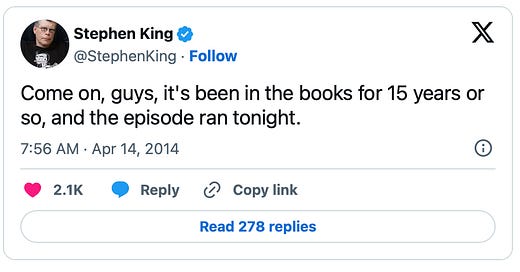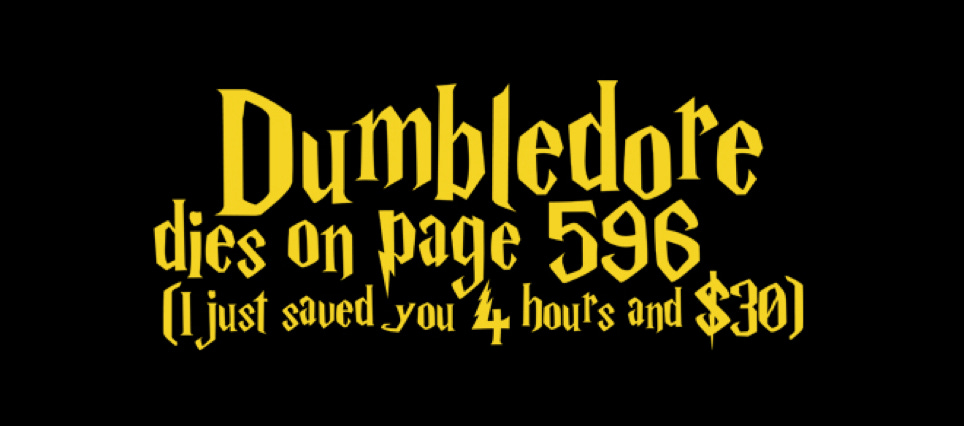The Tyranny of Spoiler Alerts
So I joined a book club recently and the first injunction made by the moderator was about spoilers. They are bad we were told in the strongest terms and were fore-warned at the pain of death (or the book club equivalent of it - removal from the group) against disclosing anything that can be perceived as a spoiler. After this I became hyper aware of all things that could be considered as spoiling the plot when reading and got my inputs to the group vetted by my family. That’s when I understood the thing - that I really cant tell what is a spoiler and what isn’t. Especially with the book we are reading. The way this specific book is written, almost every chapter seems to end in a cliffhanger and could potentially be a spoiler. So at the end of every chapter as I excitedly look around to talk about the twist to someone - anyone - I am aware, terrified to tell the ONE group I ACTUALLY signed up to do THIS EXACT thing. Instead, unable to find apt reciprocation for my excitement from my family members and unable to post about it on the book club group, I am reduced to screaming my pain out in the bathroom (not really, but it is the exaggerated equivalent of that kind of pain).
Eventually I had to ask: what is the deal with spoilers? Have we gone too far with this fear of Spoilers and who the f*** started the ball rolling on this?
The history of spoiler warnings is surprisingly recent, given we have been telling each other stories, ones with plot twists, for centuries. It was Alfred Hitchcock who first urged his viewers not to spoil the ending of his movie Psycho because he “had only one ending”. Smart line. But he didn’t use the word spoiler. That was a guy called Doug Kenney who in 1971 wrote a Satirical article called “Spoilers” for the magazine National Lampoon. He did it to help save his readers some time and money in reading the material whose endings he was spoiling. So it started as a joke and became all too serious…when the internet started.
In fact it was in the very early days of the world wide web that the term Spoiler Alert became a thing. It was first put on a discussion group called Usenet for the 1982 Star Trek movie called The Wrath of Khan. Why did this happen only when the internet got started, you wonder? As this excellent howstuffworks article on Spoilers notes it is because a) we can watch and read things on our schedule now - unlike in the early days of TV when everyone had to tune in at the same time. Coupled with this is b) our ability to easily broadcast our opinion to the multitude. This means that some of us can get to the end first and brag about it to as many as possible and so spoil it for everyone else.
This is why in recent times Spoiler alerts have become essential across all forms of communication. We see and hear it on reviews and discussions about movies, books and web series. It has become an important disclaimer and a forewarning whenever anyone discusses a work of art or entertainment. And if you chose to ignore it, the internet will come after you. Like it did for Alessandra Stanley when she mentioned key plot points of the show “Mad Men” and got called a “despicable” person. (Really? Is a person despicable for disclosing a few plot points of a show?) And this happens not just to little known journalists but even to the famous. In 2014, Stephen King was criticised for giving away a plot twist in, of all things - Game of Thrones! But then King didn’t take it lying down and dished it right back to the net.
The joke about Romeo and Juliet actually raises an important point. How long are we allowed to wait before we can officially spoil something. Vulture magazine addressed this question in an article (may be after being criticised for disclosing some important plot point). They divided these disclosures as things you can say in headlines and things you can say in the text of an article.
These guidelines are not legally enforceable of course. But neither is disclosing a spoiler unless you are contractually required to - like if you were part of a cast of the Avengers: Infinity war and you accidentally let the end slip out during an interview.
So what happened to Mark Ruffalo after this?
Nothing.
He went on to star in more Marvel movies.
And thats kinda my point. Nothing bad really happens when someone accidentally discloses a plot point. In fact there is some evidence to show that this might actually be helpful as researches at UC San Diego found out when they gathered a bunch of under grads to read short stories with and without spoilers. It turns out that in every genre of story (yes including mysteries) the experience of knowing the end actually made the reading experience better. It seems like human beings actually like knowing the end and then savouring the process of how we got there more than the momentary thrill of jumping down the cliff edge of a plot twist.
But it is the march of time….
Sigh… there was a time, a very long time, when we humans were perfectly content in knowing how stories ended. It didn’t matter because we had bigger problems to tackle and listening to a story was time to relax and connect. But that time is gone. Now consuming entertainment is an end in itself and the thrill of a good mystery makes all the difference. So those of us who do not care about such things cannot roll back time and will the world into forgetting all about spoiler alerts. But does it need to be such a tyranny? Does every conversation have to be laced with the terror of accidental disclosure?
I really hope not.
Oh and by the way…
Sources:
https://www.vulture.com/2008/03/spoilers_the_official_vulture.html
https://en.wikipedia.org/wiki/Spoiler_(media)
https://www.wired.com/story/spoiler-alerts-are-making-us-all-stupid/






